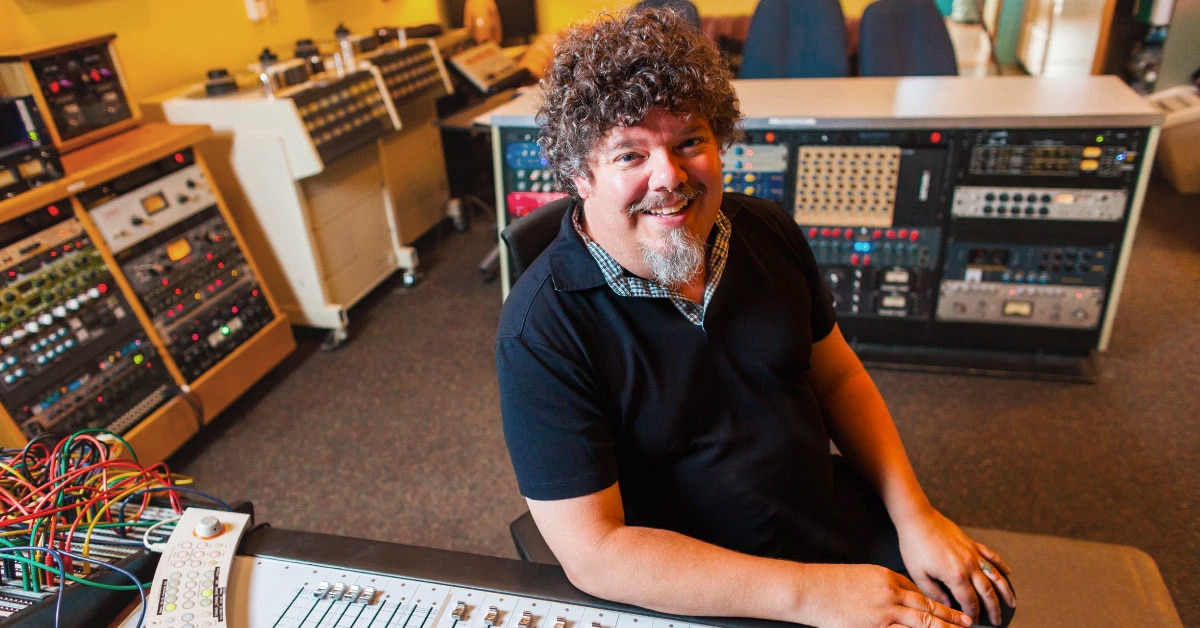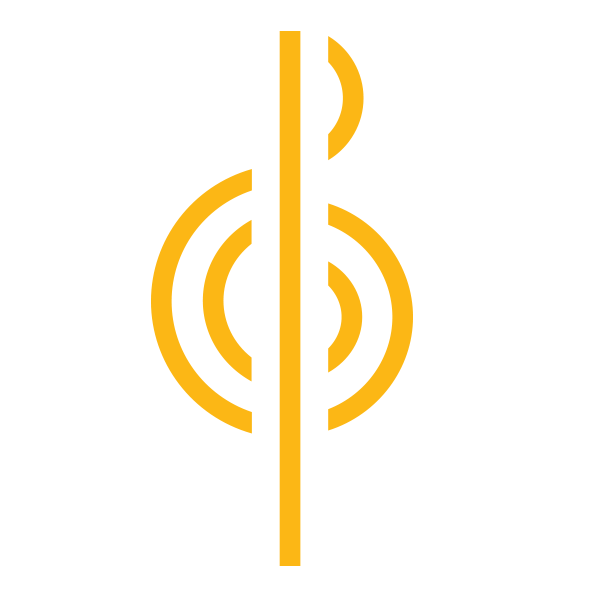Tape Op Magazine is a go-to resource focused on the creative art of recording. Founded in 1996 in the spirit of zine and DIY culture, it represents all corners of production — from home studios to legendary producers. Larry Crane, Tape Op’s founder and editor, chatted with us about the publication, as well as his work as Jackpot! Recording Studio owner and his role as the Elliott Smith Archivist.
The HUB: What inspired you to start Tape Op?
Larry Crane: I had a home studio and I was trying to learn how to engineer. I would go to the library and I’d read books, I’d go to Powell’s Books in Portland and buy books, and I’d look at magazines about the kind of music that I really enjoyed. I came out of the alternative-type music scene before it was even called that; more like post-punk. I wrote for zines across the country that reviewed music and did interviews. The scene I was coming out of wasn’t … like if I picked up a copy of “Mix” for instance, it just wouldn’t talk about any of the music that related to me and my friends and labels like Merge and even Sub Pop — they weren’t represented. And so I thought, why couldn't you have a recording magazine that focused a bit more on the underground, more like street level. So I started Tape Op as a way to look at it and a way to learn.
The HUB: How did you choose the name?
LC: The reason I called it Tape Op is because it is slang for “tape operator.” The tape operator in the UK was initially the person that was a human tape deck remote, and they’d yell at them like, “Stop! Punch in! Rewind!”.
When they got remotes they made [the tape operator] sit on the couch and learn. So I figured this is the person who is learning about recording. So that's why we call it Tape Op.
The HUB: Tell us about the first issue of Tape Op.
LC: 1996, April. It featured Greg Freeman who had been in the bands Pell Mell and The Call. He had a small studio in San Francisco back then and had recorded the band I was in, Vomit Launch, along with a bunch of really good artists like Barbara Manning, Thinking Fellers Union, and Donner Party. I thought he would be a great guy to interview about running a really low cost 8-track or 16-track studio. And Fred Cornog, East River Pipe, was recording at home on a 8-track reel-to-reel and making these really cool records that were out on Merge. And I talked to a few other friends.
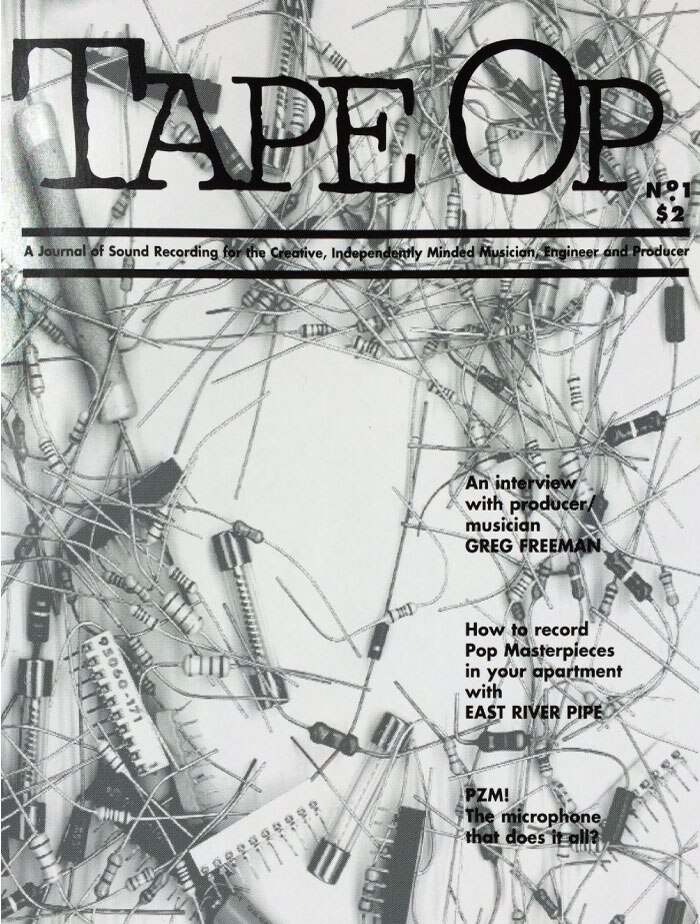
Tape Op Magazine Issue #001
The HUB: What makes a successful interview about recording?
LC: You know it’s a good interview when some breakthrough ideas are discussed, or there are magical moments to reminisce about — or something. The core of the magazine is the intersection of art and technology. There’s times maybe to say, “What do you put on a kick drum? What do you put on a snare?” But honestly, that's really boring. A failure of a lot of media when they discuss the art of making records is that they look at the technology and they don’t look at the art.
The HUB: Tell us a little bit about your studio, Jackpot! Recording.
LC: I started Jackpot! Recording Studio in ’97, basically about a year after Tape Op started. I’d had a home studio, and it was just too busy. A friend of mine said, “You and Elliott [Smith] need to talk,” We went out and had beers and I said, “Look, I don’t want a partner,” which sounds crazy, but I said, “I don’t want a partner, but I’d be happy to work out a deal. Help me build this place, bring your gear down there. We’ll just work out how much utilities and rent cost and you could pay that per day if you need to work in there — and then I’ll fill up the rest of the time.” I never charged him a cent, and we had probably only really kind of cohabitated for about six months. He moved out to Brooklyn, and he would pop in [when he was in town] and knock something out. “Hey, you busy?,” you know, and we’d record.
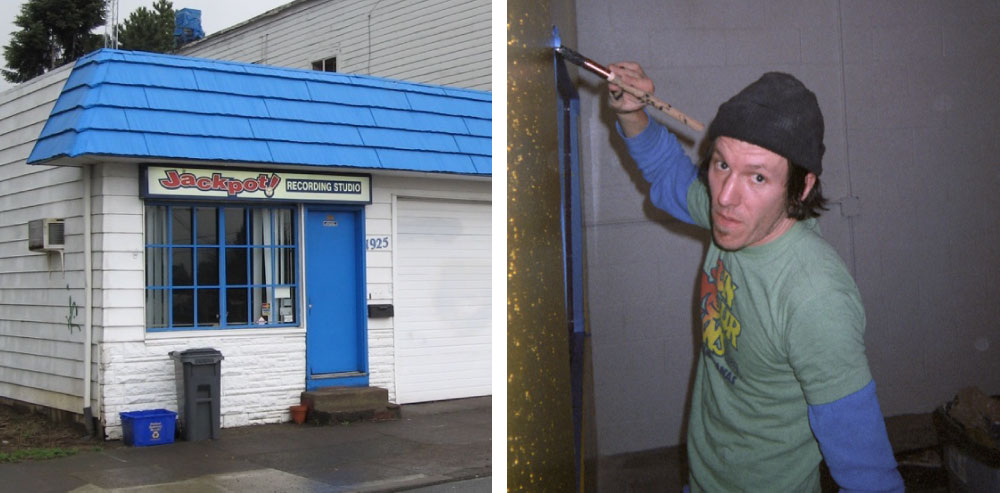
(left) Original Jackpot! Recording Studio location (right) Elliott Smith painting Jackpot!
The HUB: What songs did Elliott Smith end up recording at Jackpot!?
LC: “Miss Misery” from Good Will Hunting was one of them. I was the co-producer on “Miss Misery” but by the time he was doing XO, that was produced by Rob Schnapf and Tom Rothrock. And so the tracks that they used from Jackpot! on that — I recorded “Amity.” The other song was “Baby Britain” which Joanna Bolme recorded.
The HUB: The vocal production on Elliott Smith’s recordings stands out. Can you tell us a little about that?
LC: He wasn’t a natural singer. He wasn’t like, born to sing. As his archivist too — going through his high school years and listening to tapes and stuff — it’s like he doesn’t know what to do. At points he’s trying to sing like Joe Strummer or Elvis Costello, it’s really funny, and then he just starts to kind of find this sort of Alex Chilton-like voice that he worked with. And I think that came from things he liked — like The Zombies, and Left Banke and just sort of more textury voices. He was constantly doubling almost everything, but doubling really efficiently. He had a very musical mind so he could imagine the notes all written out in his head — like exactly how long to hold them — because most people don’t double their vocals that well.
He would have the vocal [melody] ready but he wouldn’t have the harmonies worked out, and then he would do a thing called “sending out a probe” and he would sing along with the track adding, “Ahh ahh ahh ahh ahh,” and then would be, “Roll it,” and like boom, “Give me another track.” Boom, boom, boom, boom. “Give me another track.” A typical song could be completed in six hours. It’s kind of like working with Stevie Wonder or something; you're just knocking it down.
The HUB: How did you end up as the Elliott Smith Archivist?
LC: When he passed away there was an incomplete record that I was supposed to have stayed with him in L.A. and worked with him on, From a Basement on the Hill, and they chose to have Joanna Bolme and Rob Schnapf do the mixes on that. Then there was a thought of doing an expanded edition of Either/Or for a 10-year anniversary, and his dad came to me and said, “Would you be interested in mixing it or finding the tracks and stuff?” I said, “Well, you know, really you need an archivist. Someone needs to sort all this out.” There were tapes in L.A., tapes in Portland and I had things floating around. So they said, “Do you want to do it?,” and I worked out terms and signed the contract. But I also started working on the New Moon record, went to L.A., found the tapes, shipped them up to Portland, did transfers, did rough mixes and my own mixes, wrote the liner notes, you know, all that shit. So we made a record. And there were so many leftover tracks that it became its own record because he’d already recorded almost two albums worth of material that was unreleased.
The HUB: What format are most of the Elliott Smith recordings?
LC: Oh, he was recording analog. Almost everything was 8-track reel-to-reel. He had a Tascam 38 8-track, which I also had in my home studio. When we first recorded together he actually came to my home studio because his console was broken but he knew he could just bring the reel over and record vocals. So we did the vocals on “Pictures of Me” for Either/Or at my house. He brought his microphone [Langevin CR-3A]. He used a little PAIA preamp that I’d built from a kit.
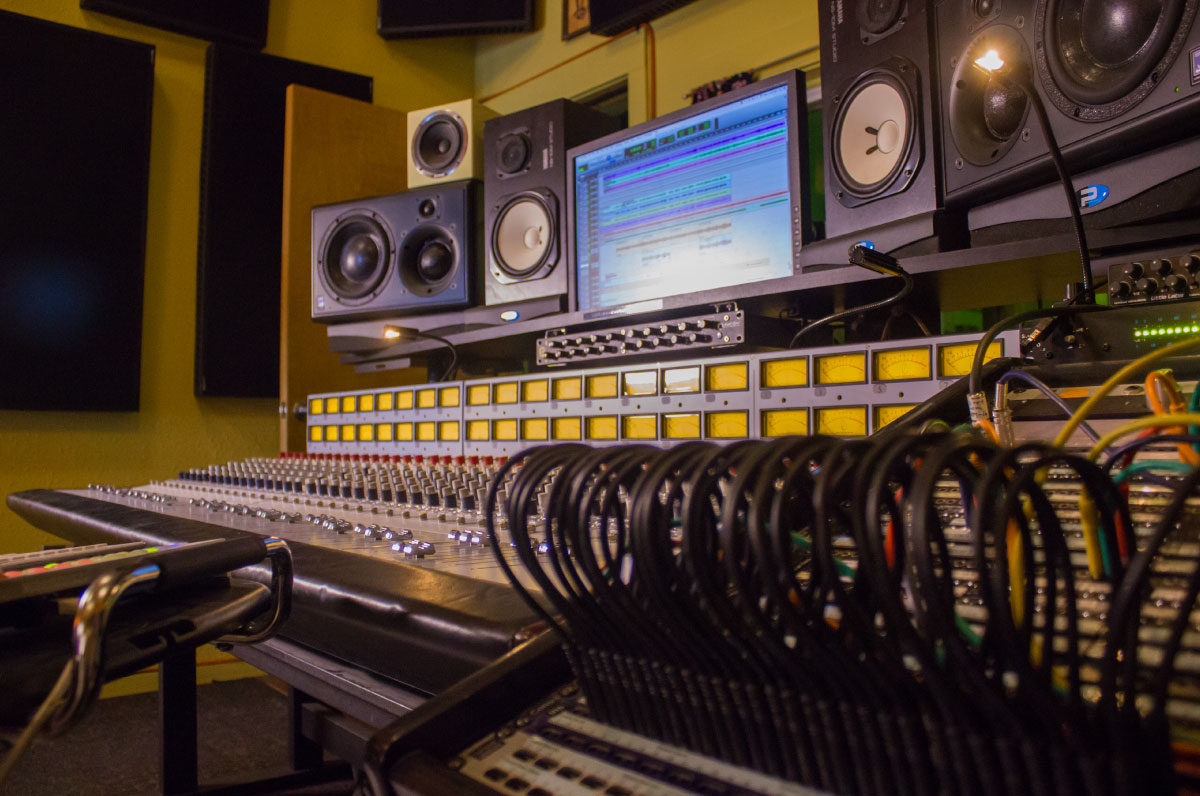
Jackpot! Recording Studio Console
The HUB: What’s happening at Jackpot! these days?
LC: Somebody’s in there. I have a studio manager named Gus Berry who went to Berklee. He books the place, keeps it busy, and we have assistants and people that work there. And, man, you know, so there’s always something going on. Got a band from the UK coming over next month for two weeks. All kinds of things.
The HUB: How many rooms is Jackpot!?
LC: Just a single room. The evolution of the studio is that the initial place was kind of a little shack and we got kicked out after 10 years — they were selling the whole block. My landlord was totally cool about it but I had to move out. My friends had some property and they were like, “Oh, do you want a place?” and they built a studio so, that's where I am now. Next door, Hamptone Pro Audio builds preamps and mic preamps, tube mic power supplies and compressors; really good stuff.
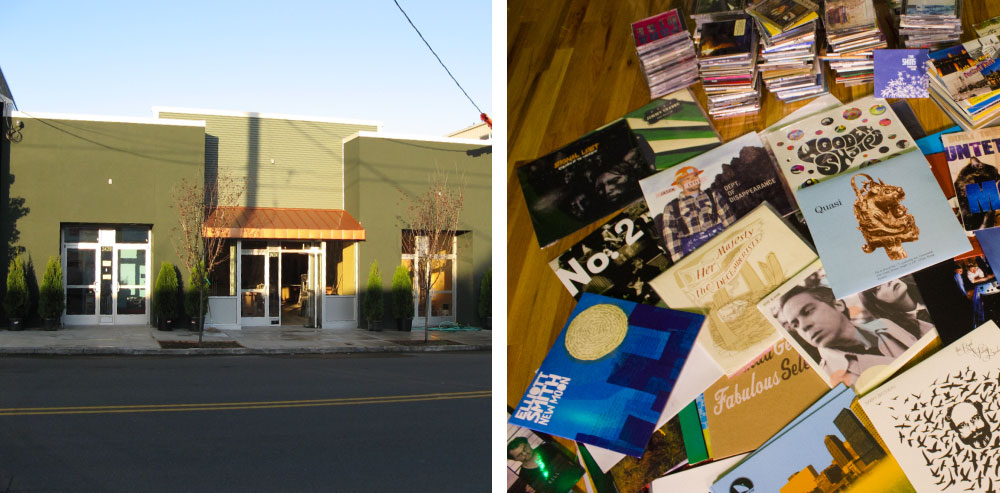
(left) Current Jackpot! Recording Studio Locaiton (right) Some records that came from Jackpot!
The HUB: Favorite Tape Op interviews?
LC: I don't know! Lots of people. Brian Eno. We were emailing beforehand and he was like, “I’m so bored of doing interviews but you ask really good questions,” and he even diverted the interview while we were doing it. He wanted to talk about stuff. Tony Visconti. That was so fun to talk to him years ago and meet him, become friendly with him. Gotye. Unreal. So fun. So excited about music when you sometimes wouldn’t expect that. Peter Gabriel briefly one time. You can kind of see some of my musical tastes here. David Byrne and Pat Dillett one time — was really fun to talk to those two together.
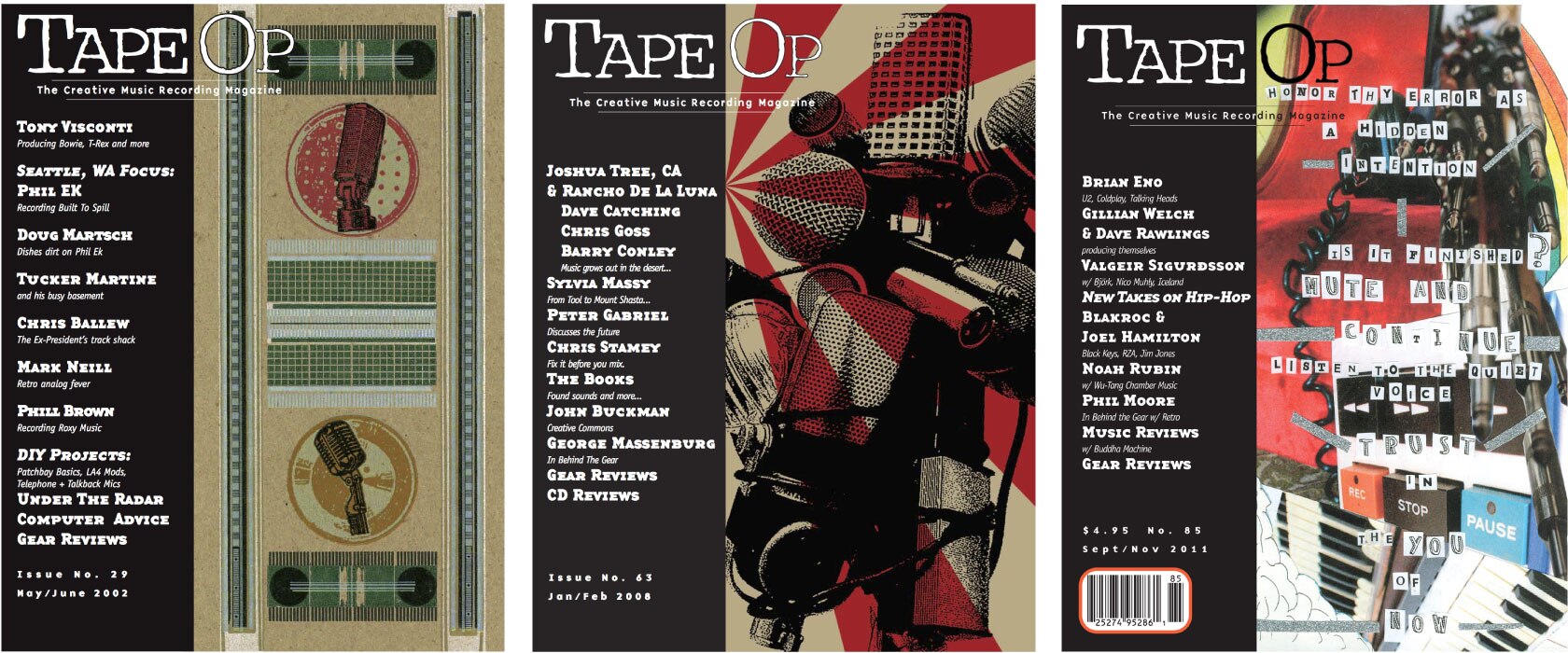
The HUB: What’s next for for Tape Op?
LC: We’re going to have an app really soon, finally. That’d be a way to read the magazine, interact with it and subscribe online. One of the things we’ve really, really, really been working on is to try and have every issue be an interesting mix of genre, gender, levels of fame, the artists they worked with, locations, every kind of balance. And then, yeah, some other ideas I can’t discuss but they could be really interesting and unusual.
The HUB: You have done incredible work building community. What advice do you have for people who want to engage with music in the way that you have?
LC: Actually, I just got inducted into to the Oregon Music Hall of Fame … It was crazy. I did a speech and the thing I talked about was how respectful I was of the history of Portland music and how excited I was to move there years ago — and to be excited about the Wipers, and the Kingsmen, and all these bands and people that had come before — and to feel that the studio was artists saying, “We need a place where someone like you records us and understands what we’re doing.” We were booked up when we opened the doors. Within a year we’d recorded “Miss Misery” and a bunch of local records, and everyone was like listening to what we were doing. And that’s the community. I didn’t want to buy a tape deck. I didn’t want to buy a microphone. I didn’t want to wire up a studio ... but I wanted to help people make music, and I think that's the most important thing. You can’t enter into this for selfish reasons. I think if you always look outside yourself and say, "It’s not about making me happy," you’ll make yourself happy by spreading it around, and I think that's the most important thing.
Keep up with Larry Crane at larry-crane.com.





































































































































